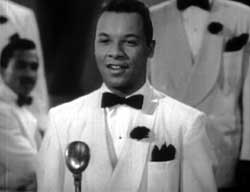 A two-reel musical Swingtime Holiday (1944) features the Delta Rhythm Boys. The lads are wearing white jackets & looking very formal, introduced by the radio emcee (Kirby Grant), performing a first-rate Duke Ellington swing tune which Duke co-wrote with Bob Russell, "Do Nothin' Till You Hear from Me."
A two-reel musical Swingtime Holiday (1944) features the Delta Rhythm Boys. The lads are wearing white jackets & looking very formal, introduced by the radio emcee (Kirby Grant), performing a first-rate Duke Ellington swing tune which Duke co-wrote with Bob Russell, "Do Nothin' Till You Hear from Me."
They retain the original's big-band sound & sophistication as they sing: "Do nothin' till you hear from me/ At least consider our romance/ If you take the word/ Of others you've heard/ Oh baby, I haven't a chance." The stylization is very reminiscent of the Inkspots, the leading harmony group in America who had eclipsed even the Mills Brothers.
They also perform "Jersey Bounce," the music written by Myron C. Bradshaw, Edward Johnson & Bobby Plater, with Buddy Feyne lyrics (under his nom de plume Robert B. Wright).
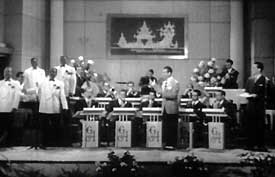 The Jersey Rhythm Boys have altered the arrangement considerably to provide for harmonizing moments, with a strong dose of Jordanesque jump-jazz: The Jersey Rhythm Boys have altered the arrangement considerably to provide for harmonizing moments, with a strong dose of Jordanesque jump-jazz:
"You better bounce/ When you get on the Jersey side/ You gotta bounce/ When you hear that rhythm ride/ They call it the Jersey bounce/ A rhythm that really counts/ The temperature always mounts.
"Whenver they play the funny rythm they play/ It started in Journal Square/ And somebody heard it there/ They put it right on the air/ And now you hear it everywhere/ Up town, they gave it new licks/ Downtown, added some tricks/ No town makes it sound the same/ As where it came from."
Though scarcely glimpsed during these two numbers, ensconced stage left are the Gus Arnham Orchestra who are responsible for the big-band sound of these two numbers. The orchestra has its own moment of glory with "Pagan Love Song."
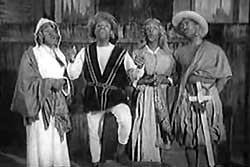 The Delta Rhythm Boys are dressed in Salvation Army versions of Italian opera costumes, one in drag, in a setting that evokes the streets of Harlem.
The Delta Rhythm Boys are dressed in Salvation Army versions of Italian opera costumes, one in drag, in a setting that evokes the streets of Harlem.
Beautiful young women are watching from apartment windows as they sing the truly silly novelty number in Rigoletto Blues (1941), a Panoram jukebox soundie produced amazingly enough by Fats Waller.
There's amazing charm in their faces, especially the lead tenor Elmaurice Miller's close-ups as he hams up a hammy tune. The girls in the windows really hate the song & begin pelting the lads, who are uncowed & keep singing.
As a comedy bit it's loads of fun, but it's hard to believe the song had even passing popularity. The unseen orchestration is provided by an inconsequential band, Steve Shultz & His Orchestra.
The lads sang another version of "Rigoletto Blues" in the comedy film Crazy House (1943), so they must've really enjoyed being comedians when chance arose.
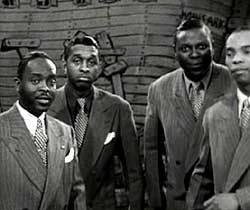 The Jubalaires, standing in front of a backdrop painting of a funky Noahs ark, begin singing in acapella the title song for the soundie Oh, Noah (1946).
The Jubalaires, standing in front of a backdrop painting of a funky Noahs ark, begin singing in acapella the title song for the soundie Oh, Noah (1946).
The jubilee harmonie sound always got them compared to the Mills Brothers or the Delta Rhythm Boys, but that's about like hearing Jerry Lee Lewis & because it's rock & roll saying it's like Chuck Berry.
The Jubilaires brought their own stylization to the four-part harmonies act, remaining in the gospel & spiritual camp unlike most such groups seeking pop group status.
Most but not quite all their songs were for the Lord, but even those among us who find religion merely superstitious will nevertheless find excitement in the folkloric sophistication of the Jubalaires' sound.
I presume it affects believers in a different way, but there's not a body who won't be at least tapping their toes while the entire tale of Noah & the ark unfolds in gospel harmonizings.
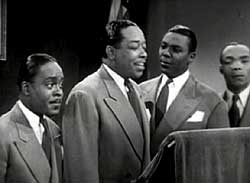 In The Preacher & the Bear (1945), the Jubalaires are shown standing behind a podium. But not wanting them to seem like "mere" gospel singers, the podium is flanked by two American flags, with a portrait of Abe Lincoln behind them, rather than the church accoutrements which would actually suit this song better.
In The Preacher & the Bear (1945), the Jubalaires are shown standing behind a podium. But not wanting them to seem like "mere" gospel singers, the podium is flanked by two American flags, with a portrait of Abe Lincoln behind them, rather than the church accoutrements which would actually suit this song better.
They sing their song to a toe-tapping congregation. It's the story of a preacher who went out to hunt one Sunday morning & shot a lot of quail, a hare, & some other stuff, but then he was threatened by a big grizzly which got him down on his knees praying for delivery like Daniel from the lion's lair, Jonah from the whale, & the three Hebrews from the fiery furnace.
This is much more a folk tune than a hymn & has several variants, most of them racist, to be sung by white folks in phony black dialect, about the "coon" preacher who fought a bear with a razor, white folks assuming every black man, even preachers, carried razors for fights.
But the Jubalairs quite rightly cleaned it up with far better & far funnier lyrics, also adding an upbeat chorus with a tune reminiscent of the Delta Rhythm Boys singing "Dry Bones."
Their wonderful version goes in part: "The bear reached out to give the reverend a hug/ Like you would hug a long lost friend/ But the reverend put on that disappearin' act/ He went splittin' through the wind/ Old reverend went to runnin' like an old hound dog tryin' to overcome a hare/ He run home to bed & took six naps before his shadow got there."
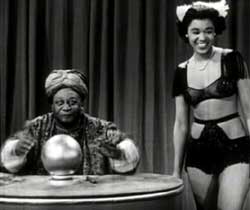 Brother Bill (1945) is an unusal soundie which begins with a skit featuring Eddie Rochester Anderson in turban, seated by his crystal ball.
Brother Bill (1945) is an unusal soundie which begins with a skit featuring Eddie Rochester Anderson in turban, seated by his crystal ball.
Mable Lee walks up to him in a skimpy showgirl outfit. She's seen in a handful of soundies including Sizzle with Sissle (1946), & is in Louis Jordan's feature film Reet, Petite & Gone (1946).
Mabel asks Eddie of the mystic hat if she can see the Jubalaires singing Brother Bill. "Quicker said than done!" replies Eddie, who adjusts his turban & rubs his crystal ball.
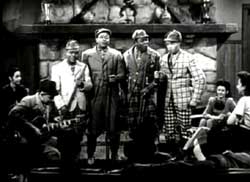 The Jubalaires then appear, dressed in deerstalker caps & ridiculous hunting jackets, holding shotguns. These four guys stand harmonizing in a hunting cabin, with some gals & a guitarist seated round about the room. The Jubalaires then appear, dressed in deerstalker caps & ridiculous hunting jackets, holding shotguns. These four guys stand harmonizing in a hunting cabin, with some gals & a guitarist seated round about the room.
It's a song about going to hunt game in eastern Maine, & is pretty much a revisit of The Preacher & the Bear, but without a preacher.
According to the lyrics, when they encountered a grizzly bear: "I drop that gun/ And away I run/ Brother Bill said boy what's the matter wid you/ Had he knowed like me he'd a run some too/ I run so fast they say/ They couldn't catch me all day/ The way I run across that field/ They couldn't catch me with an automobile." The joke is he ran all the way home to Alabama.
It's not jazzy enough to be a good song, nor funny enough to be a comical novelty number, but it's not as horrible as their jackets.
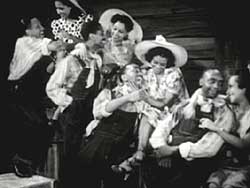 The Charioteers star in The Darktown Stutters' Ball (1942) produced by Minoco soundies production studio.
The Charioteers star in The Darktown Stutters' Ball (1942) produced by Minoco soundies production studio.
Taking their name from the song "Swing Low, Sweet Chariot," the group formed in 1930 at Wilberforce University in Ohio, & soon became regional stars with a live show on the Cincinatti station WLW, followed by a long radio run on the Bing Crosby Show. Lead Tenor Billy Williams remained the heart of the group until 1949, & the group continued until about 1955.
In The Darktown Stutters' Ball, four harmony singers are dressed in bib overalls apparently supposed to be some sort of bumpkins which doesn't at all fit their sound, which falls partway between the Delta Rhythm Boys & the Inkspots.
They saunter into the arms of some gorgeous gals as they sing: "I'll be down to get you in a taxie honey/ You better be ready about half past eight/ Now deary don't be late/ I wanna be there when the band starts playin'... I'm dance off all of my shoes/ when they play the jelly-roll blues/ Oh, tomorrow night at the Darktown Stutters' Ball."
Cute guys, cute gals, cute song, with a lovely trumpet solo tossed in for good measure, a very fine soundie.
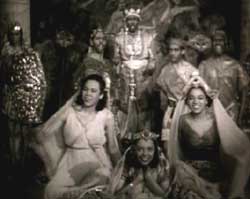 The Deep River Boys even had the same initials as the Delta Rhythm Boys, & a very similar approach to harmony singing.
The Deep River Boys even had the same initials as the Delta Rhythm Boys, & a very similar approach to harmony singing.
They first got together in 1936 when they were students at Hampton University in Virginia. They consisted of Vernon Gardener, George Lawson, Harry Douglas, Jimmy Lundy & Edward Ware.
There were a few changes over the years but they were a pretty stable group during more than forty years performing, with Harry Douglas leading the group throughout.
When in the early 1950s new forms of R & B, then Rock & Roll, pretty much eradicated jubilee style harmony groups (unless they could turn to doo-wop), the Deep River Boys, again emulating the tragectory of the career of the Delta Rhythm Boys, headed off to Europe where they sustained regular bookings.
They had more hit records in Europe than they ever had in America, including sung in Swedish & Norwegian!
In the soundie Shadrach (1941) they're dressed as Babylonian king & princes, surrounded by beautifully costumed maidens, with a golden idol seated stage right, which is a guy seated in lotus & painted gold.
They sing the folky hymn about the three Hebrews Shadrach, Meshack, & Abednego, who refused to bow down before Babylonian gods, so were thrown in a furnace where they sat unburned. It's a great number & they turn in a wonderful performance.
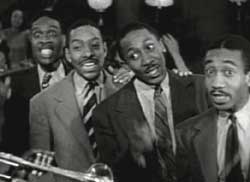 The Deep River Boys sing an exciting version of Toot that Trumpet (1941), staged as a club setting with lots of dancers, Chinese paper lanterns hanging from the ceiling, & a lively trumpet player.
The Deep River Boys sing an exciting version of Toot that Trumpet (1941), staged as a club setting with lots of dancers, Chinese paper lanterns hanging from the ceiling, & a lively trumpet player.
The dance spills out into the street where we see a super jitterbug routine in front of a brownstone's stoop. The uncredited dancers are Whitey's Lindy Hoppers who appeared in a handful of soundies in 1941, & were regulars at the Savoy Club in Harlem.
This song became a semi-standard for bands of the day because it allowed for showy trumpet solos. If the song's heyday as a near-standard didn't last it's in great part because it's a fairly workmanlike boogie number, dependent on a horn player's interpretation no matter what band performs it.
Nor are the lyrics more than corny. Yet the Deep River Boys make as much of "Toot that Trumpet" as is possible & the overall exuberance of the soundie makes it totally enthrallling.
copyright © by Paghat the Ratgirl
|
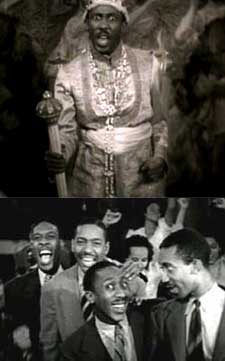

 The Jersey Rhythm Boys have altered the arrangement considerably to provide for harmonizing moments, with a strong dose of Jordanesque jump-jazz:
The Jersey Rhythm Boys have altered the arrangement considerably to provide for harmonizing moments, with a strong dose of Jordanesque jump-jazz:



 The Jubalaires then appear, dressed in deerstalker caps & ridiculous hunting jackets, holding shotguns. These four guys stand harmonizing in a hunting cabin, with some gals & a guitarist seated round about the room.
The Jubalaires then appear, dressed in deerstalker caps & ridiculous hunting jackets, holding shotguns. These four guys stand harmonizing in a hunting cabin, with some gals & a guitarist seated round about the room.

